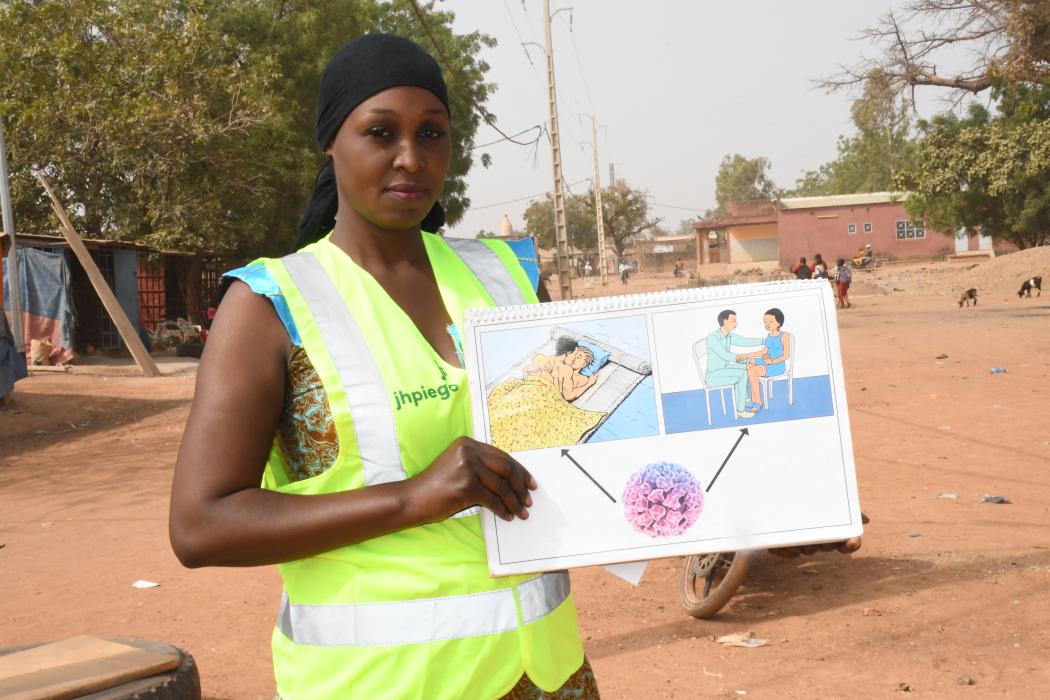In Burkina Faso, Community Health Workers Raise Awareness about Cervical Cancer

Belguissa Ouédraogo, a community health worker in Burkina Faso, visits women in her community to share critical health information. Photo courtesy of Jhpiego
Recognizable by her bright yellow vest and box of colorful charts, Belguissa Ouédraogo spends her day visiting homes in her community to talk to women about health. She explains how they can protect themselves and their families from malaria; the importance of prenatal visits, childhood vaccinations, and family planning; and, more recently, the prevention and treatment of cervical cancer.
Ouédraogo is a community health worker in Bissighin, a district on the northern outskirts of Ouagadougou, the capital of Burkina Faso. For more than seven years, this young mother has volunteered with the health and social promotion center in her community to raise awareness about behaviors that support good health.
“My decision to become a community-based health worker started from an observation that I made in many women in our neighborhood,” Ouédraogo says. “At the health and social promotion center, health workers did their best to give us advice on the right behaviors to adopt for our health and that of our family members. But back home, most women did not apply them. . . . I thought that by being a community-based health worker, I could help these women adopt good behaviors that would protect them from certain diseases.”
In the past few years, Ouédraogo has become more involved in the fight against cervical cancer, a slow and silent—yet preventable—disease that can kill if not detected in time.
Community health workers and SUCCESS
Cervical cancer is one of the most common cancers among women, with an estimated 604,000 new cases and 342,000 cervical cancer deaths in 2020—about 90% of which are in low- and middle-income countries. In 2020, Burkina Faso recorded 1,132 new cases and 839 deaths from the disease.
The key message is that cervical cancer is a disease any woman can avoid if she is informed and sensitized. -Belguissa Ouédraogo
To reverse this trend, the Unitaid-funded, Expertise France-led Scale Up Cervical Cancer with Secondary Prevention Strategy (SUCCESS) project supports Burkina Faso’s Ministry of Health and Public Hygiene by improving access to cervical cancer prevention and treatment services. To achieve its goal of reaching 40,000 women in Burkina Faso, including 26,000 women living with HIV (who are at heightened risk of cervical cancer), the SUCCESS project, implemented by Jhpiego in Burkina Faso, relies on community health workers like Ouédraogo, who generate demand for screening among women in their communities.
Ouédraogo’s interest in cervical cancer followed a SUCCESS project training session. “I admit that I did not know much about cervical cancer,” she says. “The training allowed me to understand the disease, its mode of transmission, its evolution toward the stage of cancer. But, the key message is the fact that it is a disease that any woman can avoid if she is informed and sensitized.”
Ouédraogo’s day starts at 7:30 a.m., after she drops her children off at school. Carrying her box of illustrated cards with answers to questions women may have, she makes her rounds to households to “preach the good word” of the fight against cervical cancer. Later, after the family’s mid-day meal, she heads out again, spending another two hours educating women in her community.
Perseverance pays
Not all the women Ouédraogo meets are willing to listen right away, let alone get screened. Some challenge her, asking if she’s been tested. In response, Ouédraogo presents the results of her own examination. Still, she often must return several times before the most skeptical agree to be tested.
Her perseverance has paid off. Several of the women she talked to about screening were found to have precancerous lesions, and were treated free of charge thanks to the SUCCESS project. One of these women, Rouki Compaoré, says, “I thank Belguissa for the time she took to convince me. . . . When I finally decided to get tested, the results revealed that I was developing precancerous lesions. The health center team was able to treat them. This treatment saved my life.”
Ouédraogo says she finds her joy in her work as a community health worker: “The moral satisfaction that I feel knowing that I have contributed to saving the lives of these mothers is a great source of motivation for me and it pushes me to always work with the SUCCESS project.”
Through the three-year SUCCESS project, Jhpiego also supports community health workers in Côte d’Ivoire, Guatemala, and the Philippines to raise awareness and generate demand for cervical cancer services. More than 100,000 women in the four countries have been screened.
SUCCESS in the Philippines
Meet another dedicated SUCCESS health worker, Donna Miranda, who educates Filipino women on the importance of cervical cancer screening and treatment.
“I find it rewarding,” Miranda says. “I choose to do this every day, here working with people, helping them figure out solutions, bringing health services to the people.”
The Third International Community Health Workforce Symposium will be held March 22–24, 2023, in Monrovia, Liberia, in support of “Advancing community health worker programs to build resilient and equitable health systems that accelerate primary health care for universal health coverage.” Jhpiego works hand in hand with community health workers around the world, recognizing their vital role in ensuring that all women—no matter where they live—have access to quality, respectful health care to live healthy, safe, and empowered lives.
